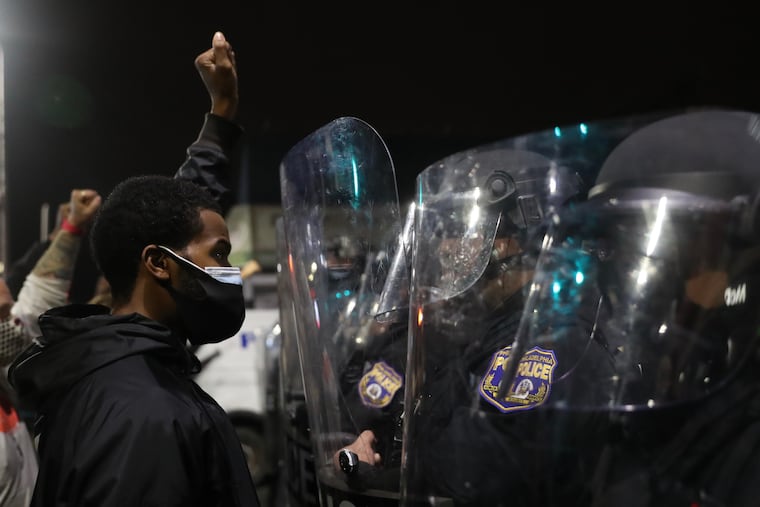Six months after Walter Wallace Jr.’s death, what have we learned about policing? | Opinion
One thing: Police need more effective training and national standards to reduce the use of excessive force.

Last October, Walter Wallace Jr., a 27-year-old Black man armed with a knife, was fatally shot by two Philadelphia police officers. In the nights that followed, protesters took to the streets, expressing anguish and outrage over another use of deadly force by police against a person of color. On Thursday, Wallace’s family announced plans to sue the officers who killed him as well as the city, alleging that inadequate police training led to his death.
Whenever such episodes occur, they are inevitably followed by a call for more police training. But simply adding hours at police academies won’t produce the results we all seek.
The fact is, American police training is woefully inadequate. It’s too brief, it fails to devote enough time to the skills and behaviors that would help officers manage the types of situations they encounter most often — and it urgently needs to be fixed.
» READ MORE: Family of Walter Wallace Jr. sues Philadelphia police officers who fatally shot him
We serve on the Council on Criminal Justice Task Force on Policing, launched last November to identify the policies and practices most likely to reduce violent encounters between officers and the public. With two police chiefs, a pioneering member of the Black Lives Matter movement, and a mother whose unarmed son was shot by an officer, our task force reflects a diverse range of perspectives — and our members don’t see eye to eye on everything.
We do agree on the importance of using research and evidence to improve policing, and we’re evaluating more than two dozen proposed reforms focused on preventing excessive use of force, reducing racial biases, increasing accountability, and improving the relationship between police and communities.
Last month, the task force released its assessments of police training. We started with basic training, which aims to teach recruits the policies, practices, and procedures they must know in order to deliver public safety lawfully, respectfully, and equitably.
In the United States, police receive relatively few hours of training compared with what comparable democracies require — an average of six months, far less than the two years required in Great Britain. While standards vary among states, police training requirements are typically on par with those for professions involving little human interaction.
The content of basic training raises greater concerns, largely because of its heavy emphasis on physical and technical skills, such as the use of firearms. Police officers have dangerous jobs, but a large share of their work depends far more on effective conversation and problem-solving than how to fire a gun. Officers need more instruction on communication and critical thinking skills, which are vital to their everyday interactions, and their own safety.
In addition to fortifying basic training, police agencies should embrace other, more focused trainings with proven track records. Promising among them is de-escalation, which trains officers on how to defuse volatile situations — like the encounter with Wallace — before using force. (On a related note, we must also find ways to better integrate social and mental health services into our public safety strategies.)
Research shows that de-escalation training can reduce the use of force and injuries to both officers and community members. The task force recommends that police agencies fully integrate it into all aspects of the training curriculum, and regularly recognize officers who successfully de-escalate situations, which can reinforce agency-wide compliance with such tactics.
Because of the wide variance in training among agencies, the task force also urges Congress to adopt national certification and training standards. Training on elements such as constitutional policing, de-escalation, and evidence-based policing should be consistent nationwide, as should guidance on how to implement, track, supervise, and assess the use of that training in practice.
While improving training is critically important, it won’t be sufficient. Police departments also need clear policies and standards that hold officers accountable, deployment strategies that encourage officers to engage in problem-solving, and supervisors committed to changing departmental culture.
» READ MORE: Walter Wallace Jr.’s tragic death a reminder police should not lead mental health response | Opinion
Walter Wallace Jr. was a father and aspiring rapper who suffered from a mental illness and, according to his relatives, was in crisis when he was shot. Let’s equip our public safety officers with the training, supervision, policies, and critical thinking skills they need to better manage encounters like the one that unjustly left him dead. Lives depend on it.
Michael Nutter is the former mayor of Philadelphia and a professor of practice at Columbia University’s School of International and Public Affairs. Cynthia Lum is a professor of criminology, law, and society and director of the Center for Evidence-Based Crime Policy at George Mason University. Both serve on the Council on Criminal Justice Task Force on Policing.